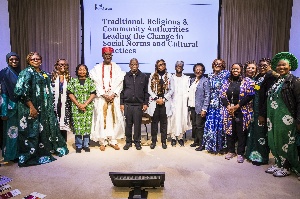- Home - News
- Elections 2024
- News Archive
- Crime & Punishment
- Politics
- Regional
- Editorial
- Health
- Ghanaians Abroad
- Tabloid
- Africa
- Religion
- Photo Archives
- Press Release
General News of Thursday, 27 March 2025
Source: www.ghanawebbers.com
Ford Foundation hosts West African leaders fighting gender-based violence
The Ford Foundation Center for Social Justice hosted an important hybrid event. It was titled “Traditional, Religious, and Community Leaders Driving Meaningful Change.”
The event addressed gender-based violence in West Africa. This was part of the 69th session of the Commission on the Status of Women (CSW69).
It marked the 30th anniversary of the Beijing Declaration and Platform for Action. The foundation aims to prevent gender-based violence and promote justice for women and girls.
The discussion highlighted how traditional, religious, and cultural leaders can change harmful social norms. A distinguished panel shared their work with the Ford Foundation’s Office of West Africa. They focus on preventing violence against women and promoting gender equality.
Panelists included Igwe Nnaemeka Alfred Achebe CFR, Obi of Onitsha; Father George Ehusani; and Dr. Awwal Nasir. They discussed their experiences in challenging harmful norms.
They identified various forms of gender-based violence. These include physical violence, sexual assault, harmful widowhood practices, and intra-family violence in polygamous settings.
Igwe Achebe referred to this issue as “the culture of silence.” This culture keeps painful truths hidden within families and communities.
Gender-based violence is a widespread problem in West Africa. Deep-rooted social norms driven by patriarchy fuel inequality against women and girls.
Sarita Gupta from the Ford Foundation spoke at the session. She said traditional leaders shape societal norms significantly.
Gupta emphasized collaboration with local leaders to inspire grassroots transformation. This partnership can create lasting change that prevents violence and promotes gender equality.
The foundation's efforts are part of a broader initiative against gender-based violence worldwide. By supporting community leaders, they aim for a more just society for women everywhere.
Leaders stressed creating context-specific approaches to transform harmful practices limiting women's participation.
Igwe Achebe noted that addressing socio-economic root causes is essential to combat gender-based violence. He mentioned poverty, unemployment, and substance abuse as contributing factors.
He advocated for economic empowerment programs and strengthening female leadership as solutions to reduce violence.
Reverend Father George Ehusani highlighted religious leaders' roles in shaping attitudes toward gender justice. He urged them to challenge harmful interpretations of scripture.
His foundation has trained over 500 Christian leaders to address gender-based violence through ‘Centers of Excellence.’ These centers advocate zero tolerance towards violence while supporting women's legal rights.
Dr. Awwal Nasir emphasized empowering local leaders to speak out against violence. He shared successes from the Muslim Opinion Leaders project funded by Ford Foundation.
This project raised awareness about gender-based violence through sermons in Northern Nigeria while respecting cultural traditions.
Priscilla Usiobaifo from BraveHeart Initiative stated grassroots advocacy is crucial for change. Her organization engages local leaders through town hall meetings to reform harmful traditions like female genital mutilation (FGM).
Participants called for stronger institutions that protect women's rights while enabling their active participation in policymaking.
Key action points included promoting advocacy frameworks that support women's engagement in community life. This involves reinterpreting misused religious teachings to safeguard women from harm.
Ford Foundation’s Office for West Africa aims to reduce gender-based violence through its Gender, Racial, and Ethnic Justice Strategy. They work with community leaders to promote positive cultural practices while transforming harmful ones.
The foundation recognizes these leaders' vital role as custodians of cultural norms that often condone inequality. Their goal is stronger systems that protect women's rights effectively.











